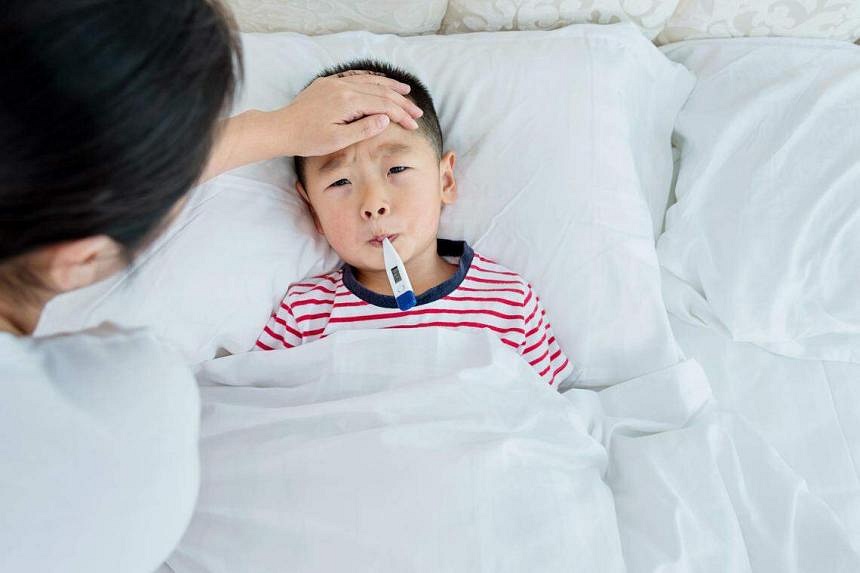Doctors see rise in flu cases in Singapore as borders open and masks come off

SINGAPORE – More people in Singapore have been falling ill with influenza in the past few months, with doctors seeing a rise of as much as 30 per cent in cases.
Experts tell The Straits Times this is due to the resumption of travel, more people letting their guard down and reduced herd immunity to flu.
Dr Philip Koh, chairman of Healthway Medical Group’s medical board, estimates a 20 to 30 per cent increase in the number of patients with flu-like symptoms since late December 2022, when people started returning from their travels.
“If they are unwell and go to work and school, it can escalate the number of people falling sick. If they gather without masks in large numbers during the festive season such as New Year’s and Chinese New Year, the numbers can also shoot up,” he says. He practises in Healthway Medical Group’s Tampines clinic.
Dr Leong Choon Kit, a family physician at Mission Medical Clinic in Serangoon, also notes a 30 per cent rise in the number of patients with flu since early January.
The flu season in Singapore, he says, typically occurs between November and February, with countries in the Northern Hemisphere experiencing winter during this time.
“Colds, flu and other respiratory illnesses are more common in the colder months, which coincide with the holiday season worldwide, especially as Singaporeans travel to winter countries for the holiday and return in December,” he adds.
The cooler weather in Singapore may have also contributed to the increase in patients falling sick, with some being caught in the rain in recent weeks, says Dr Koh.
In addition, the gradual relaxation of Covid-19 measures may have resulted in a spike in the number of people catching flu, say experts.
Dr Kelvin Goh, chief medical officer of Northeast Medical Group, which runs primary-care clinics, has seen a 30 per cent increase in patients since Singapore’s disease outbreak response reverted to green – the lowest level – in February.
With fewer people wearing masks and more people “revenge” gathering and shopping, there is greater intermingling and a higher chance of infection, he says.
The herd immunity for flu also waned during the Covid-19 pandemic, which Dr Goh says was because many people were isolated, avoided mingling with others and paid more attention to their hygiene.
“This caused the infection rate for influenza to plunge, resulting in immunity against the flu declining. Hence, the proportion of susceptible population then increases and infection thus spreads much faster now that we have resumed pre-pandemic living conditions,” he adds.
The reduced herd immunity could also be due to the fact that many people were not keeping up with their flu vaccinations during the pandemic, hence making them more vulnerable to catching it now, says Dr Leong.

Some doctors are seeing more children falling sick too.
Dr Dale Lim of The Tenteram Clinic in Whampoa saw an average increase of 20 per cent in cases in January and February 2023 compared with November and December 2022, with the bulk of cases being children.
With the easing of safe management measures, children are allowed to intermingle more freely in school, so there is a higher likelihood of flu viruses spreading among classmates and schoolmates compared with the past two years, he says.
“I have also noticed that more children present with troublesome symptoms that require repeat consults for high fever and prolonged upper respiratory tract symptoms such as cough and nasal congestion. The surveillance swabs performed at my clinic showed that many of them have concurrent viral infections, with two or more viruses detected,” says Dr Lim.
Dr Leong Hoe Nam, an infectious diseases specialist at Rophi Clinic, says most cases of upper respiratory tract infection were due to Covid-19 until the middle of 2022.
“Influenza was on the rise then and became the predominant virus in the second half of the year. Towards the end of last year, we started seeing all the cold viruses returning, from rhinovirus to enterovirus to respiratory syncytial virus and parainfluenza,” he says.
Dr Chua Xiuzhen of Kids Clinic at Sengkang has seen a 5 per cent uptick in flu cases in recent weeks.
“Many young children tend to cough and sneeze into the air and use their hands to wipe away their mucus. They tend to rub their eyes when they are tired or touch their noses and mouths before they wash their hands. It is not difficult to imagine how easily children can fall prey to the influenza virus,” she says.
Doctors say it is common for children with flu to pass it to their parents and other family members in the household.
Says Dr Chua: “I often meet the parents a few times after the first child in the family falls ill. They often come in and announce, ‘It’s me again. This is my other child.’ More often than not, the parents will also be sniffling behind their masks.”
With small living spaces in Singapore, experts say it is difficult to prevent the spread as fomites are everywhere.
The virus may also be contained in the home if the windows are often closed with poor ventilation, says Northeast Medical Group’s Dr Goh.
Adults tend to be more careful when they are sick compared with kids.
Healthway Medical Group’s Dr Koh says: “Kids mingle with one another in close proximity in school, and they are less cautious about cleanliness. They may touch their mucus, and then touch the sofa and bed. That’s how it spreads among family members at home.”
How to minimise the spread of flu
Doctors advise people to practise good habits such as covering your mouth and nose when coughing, as well as washing your hands regularly with soap and water.
While it may not be possible to stop little ones from exploring and touching surfaces, good hygiene can be inculcated from a young age, says Dr Chua.
For example, children can be taught to avoid touching their eyes, noses and mouths before they wash their hands.
“This might seem impossible to many parents. However, you will be surprised at the impact that your tone of approval or disapproval, or your praises and smiles, can have on your little ones,” says Dr Chua.
She also advises people to stay at home if they feel unwell and wear a mask if they need to go out.
While it is not possible to avoid falling ill completely, the best defence is maintaining a balanced diet which is rich in fruit and vegetables, and get enough exercise every week, says Dr Koh.
Experts also highlight the importance of taking an annual flu jab, especially for children aged six months to below five years and adults aged 65 and above.
Says Dr Koh: “It’s not 100 per cent prevention, but it reduces the chance of catching flu and reduces the complications of flu, especially for the elderly and vulnerable, whose immune systems may be weak.”
Join ST's Telegram channel and get the latest breaking news delivered to you.





No comments:
Post a Comment